By MORDECAI SPECKTOR
Early in a phone chat last week with Seymour Hersh, the Pulitzer Prize-winning investigative reporter mentions, regarding his upcoming visit to Minneapolis, that his “neighbor is a guy named Peter Edelman, who used to work for Bobby Kennedy.”
Edelman, a Minneapolis native, who has had an illustrious career in law and politics, lives a few doors down from Hersh, and “he’s always talking about his growing up in Minneapolis.”

Hersh, who won the 1970 Pulitzer Prize for uncovering the My Lai massacre during the Vietnam War, will be visiting Minneapolis again next week to participate in the University of Minnesota College of Continuing Education’s “Great Conversations” series.
The event on the evening of Tuesday, March 10 will feature Hersh, former Vice President Walter Mondale, and Larry Jacobs, the U of M’s Mondale Chair for Political Studies and director of the Center of the Study of Politics and Governance at the Humphrey Institute.
The topic of the March 10 forum is America’s constitutional crisis. Hersh, who makes a clear separation between talking off-the-cuff and his well-researched and vetted journalism, admits that he is “not thinking much about” the forthcoming discussion.
Pressed a bit, Hersh ventures that the constitutional crisis to be discussed is “the one precipitated by the yahoos we knew at the Bush administration. My thesis is that we don’t really know the extent of the crisis.”
Hersh, 71, who has been chronicling the foreign policy exploits of the Bush administration over recent years for The New Yorker magazine, explains, “After 9/11, if you were Muslim in America, you were basically living under martial law.”
Speaking to the AJW from his office in Washington, D.C., Hersh admits that he doesn’t know precisely what was said inside the Bush administration’s chambers, but wonders, “Did they say to themselves, Look, we can do whatever we want as long as we leave white, middle-class America alone? Because they essentially did after 9/11; they just abused the rights of Muslims, and we didn’t care.”
Hersh’s comments came on the day last week that the Los Angeles Times published a feature story about an FBI informant, Craig Monteilh, who infiltrated mosques in 2006 and 2007, ostensibly to “thwart terrorist operations in the Orange County Islamic community.”
The newspaper article focuses on the federal prosecution of Ahmadullah Sais Niazi, who authorities allege had links to al-Qaida and was plotting bombings in southern California. The story also mentions that local Muslims had reported Monteilh, the FBI’s informant, to the FBI “as an extremist. In June 2007, the Council on American-Islamic Relations reported Monteilh to the FBI as a possible terrorist, said Hussam Ayloush, the council’s executive director in Anaheim.”
In his reporting on the government’s questionable investigative tactics and the prosecution of the “war on terror” in the post-9/11 period, Hersh has shed light on little known aspects of U.S. foreign policy. His July 7, 2008, story in The New Yorker, “Preparing the battlefield,” was widely reported. The piece revealed details of the Bush administration’s expanded covert war against Iran. Hersh noted that U.S. Special Operations Forces had been conducting cross-border operations from southern Iraq in 2007, and recently had stepped up its efforts to subvert the Iranian government through the involvement of the Central Intelligence Agency and the Joint Special Operations Command.
U.S. policy toward Iran has been the subject of great debate lately, as the new Obama administration has embarked on a course of engaging the Iranian leaders in diplomacy, which is aimed at stopping their uranium enrichment program. Throughout much of last year, pundits were predicting either an American or an Israeli attack on Iran’s nuclear installations.
“I think that Iran is sending a lot of signals right now, that they’re open” to diplomatic engagement with the U.S., Hersh comments. Likewise, he says that Obama “said some very calculated, very interesting things” about the contours of a new U.S. policy towards Iran. The famed journalist and author (his most recent book is Chain of Command: The Road from 9/11 to Abu Ghraib) sees a “tweaking of language that suggests” a new U.S. “willingness to engage” with Iran.
Asked about a preemptive Israeli strike on Iran’s nuclear facilities, Hersh responds, “It’s just such a reckless gamble,” and suggests that damaging the Natanz complex, which “is buried under 75 feet of pretty much hard rock,” presents a significant technical challenge for the Israeli military.
Israel would need U.S. military cooperation in such an enterprise, Hersh remarks, “and they’re not going to get us.”
The journalist emphatically rejects suggestions that he’s anti-Israel. “That’s crazy. I’ve got great friends there,” says Hersh, who frequently visits the Jewish state. “The Israelis are as much fun as anyone in the world.”
Hersh is currently working on a story for The New Yorker on Syria, which he has visited recently. He would not say too much about his piece on the change in U.S. relations with the Assad regime, because he knew that the AJW story would appear before his article would be published.
A Chicago native and the son of Jewish immigrants from Lithuania and Poland, Hersh seems to be looking forward to his Midwest visit. He reminisced about his associations with Mondale; former Minnesota senator, vice president and presidential candidate Hubert Humphrey; and Eugene McCarthy.
For a brief period in 1967 and 1968, about five months, Hersh served as the press secretary for McCarthy’s presidential campaign. He has fond memories of the primary campaign in Wisconsin.
“We were living in the Schroeder [Hotel in Milwaukee] and it was a great time…. we had an amazing staff. Paul Newman used to give speeches for us.”
The late movie actor and Democratic Party activist would visit Hersh’s suite in the evening and ask for advice on answering questions he was getting on the campaign trail. “He was wonderful,” Hersh recalled.
***
The University of Minnesota College of Continuing Education’s “Great Conversations” discussion will take place 7:30 p.m. Tuesday, March 10 at the Ted Mann Concert Hall, 2106 Fourth St. S., on the U of M West Bank campus. The discussion will be followed by a dessert reception with the speakers. Tickets are $28.50 ($23.50 for U of M faculty, staff and students). For tickets, call 612-624-2345.
(American Jewish World, 3.6.09)
Update
The “Great Conversations” event turned out to be a fascinating and depressing review of 40 years of U.S. government skullduggery, culminating in the executive power grab during the Bush-Cheney years. Seymour Hersh cautioned the mostly older audience members that the press, or what’s left of the investigative reporting corps at major newspapers, will have to be on their game to keep the Obama administration accountable. He said that the Afghanistan and Iraq wars, and the future of U.S.-Iran relations, will be daunting challenges for Obama, whose first priority is mitigating the economic crisis.
Hersh also discussed what he said was an ongoing covert government operation — an “executive assassination ring” — that was alluded to in a New York Times story yesterday about civilian casualties and shifting U.S. policy in Afghanistan. Eric Black, writing for MinnPost.com, has a fairly thorough account of last night’s discussion at the Ted Mann Concert Hall on the U of M’s West Bank campus. (There’s an audio recording of the event embedded in the story.) — Mordecai Specktor
Update / 2
The “Great Conversations” folks have archived a link to the Hersh-Mondale-Jacobs discussion on Tuesday night. This is a handier audio resource, with the rewind-forward feature.



















